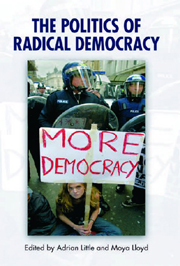Book contents
- Frontmatter
- Contents
- Acknowledgements
- Notes on the Contributors
- Introduction
- 1 Rhetoric and Radical Democratic Political Theory
- 2 Performing Radical Democracy
- 3 Aboriginal Sovereignty and the Democratic Paradox
- 4 Judith Butler, Radical Democracy and Micro-politics
- 5 Post-structuralism, Civil Society and Radical Democracy
- 6 Hegemony and Globalist Strategy
- 7 Is ‘Another World’ Possible? Laclau, Mouffe and Social Movements
- 8 Friends and Enemies, Slaves and Masters: Fanaticism, Wendell Phillips and the Limits of Agonism
- 9 The Northern Ireland Paradox
- Conclusion
- Bibliography
- Index
Introduction
Published online by Cambridge University Press: 12 September 2012
- Frontmatter
- Contents
- Acknowledgements
- Notes on the Contributors
- Introduction
- 1 Rhetoric and Radical Democratic Political Theory
- 2 Performing Radical Democracy
- 3 Aboriginal Sovereignty and the Democratic Paradox
- 4 Judith Butler, Radical Democracy and Micro-politics
- 5 Post-structuralism, Civil Society and Radical Democracy
- 6 Hegemony and Globalist Strategy
- 7 Is ‘Another World’ Possible? Laclau, Mouffe and Social Movements
- 8 Friends and Enemies, Slaves and Masters: Fanaticism, Wendell Phillips and the Limits of Agonism
- 9 The Northern Ireland Paradox
- Conclusion
- Bibliography
- Index
Summary
Radical democracy emerged in response to the crisis that affected Western left-wing thought throughout the second half of the twentieth century. This crisis was the product of a number of factors, including a mounting disaffection with the capacity of socialist, and in particular, orthodox Marxist thought to explain developments in the industrialised world; the appearance of various social movements (including feminism, gay and lesbian rights, and environmentalism) that challenged the centrality of class-based politics; the expansion of multicultural protest; the events of 1989 that signalled the demise of Communism; the break-up of the Eastern bloc; and the spread of both capitalism and liberal democracy (or, perhaps better, liberal capitalism) to ever-increasing areas of the globe. The theory of radical democracy – or rather theories, since there is no single version – developed as a way to address the challenges posed by these developments. So what is radical democracy?
The first version to note takes its co-ordinates from debates on the US left. As Barbara Epstein comments, here, ‘“radical democracy” has come to replace “socialism” as the point of reference for what used to be called left politics’ (1995: 127). This shift, initiated in large part by Stanley Aronowitz's 1994 essay, ‘The Situation of the Left in the United States’, advocated replacing the term ‘socialism’ with that of ‘radical democracy’ as a better way to capture the breadth and heterogeneity of ‘left’ struggles, post-60s, against what was perceived to be the universalising tendencies of socialist thinking. While many followed his lead – though not Epstein – their use of the term ‘radical democracy’ frequently differed.
- Type
- Chapter
- Information
- The Politics of Radical Democracy , pp. 1 - 12Publisher: Edinburgh University PressPrint publication year: 2008



